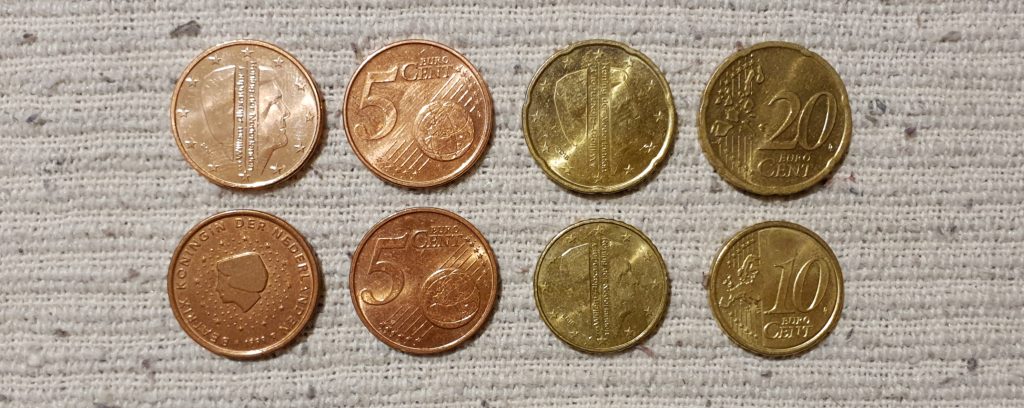Dutch Money: The Dutch Euro Posted by Sten on Feb 24, 2020 in Culture, Dutch Language
Geld (money). It is the lifeblood of our economieën (economies) and we need it in our dagelijks leven (daily life) for everything from boodschappen (groceries) to treinkaartjes (train tickets) to buying a rijbewijs (driver’s license) once you get tired of all the vertragingen (delays) of the Dutch trains. Last week, we talked about the gulden, the Dutch currency before the country joined the euro. But what does the euro look like in the Netherlands? Let’s have a look.
Click here for other posts in the series on Dutch Money.
New Dutch Coins!
The euro was introduced in the Netherlands on January 1, 2002, together with eleven other European countries. Over the years, a few more countries have joined the currency. The official sign for the money changed from the ƒ, which stood for the gulden, to the €, the euro sign. But more notably, Dutch coins changed, too!
The eurocenten (euro cents) looked quite different from the gulden. Above you can see 5 cents, 10 cent and 20 cent coins. As you can see, the kop (heads) changed over time.
The lower left 5 cent displays Koningin Beatrix (Queen Beatrix), looking left. The text says Koningin der Nederlanden, and the year 1999. 3 years before the introduction of the euro, some countries already began minting their coins. And the Dutch decided to add the minting year, not the year when it went into circulation.
Since 2013, her zoon (son) Willem-Alexander is Koning (king). This means, as tradition dictates, a new kop (head) on the coin! Ever since 1816, the vorst (monarch) of the land gets their face printed on the coins. This tradition continued with the euro. And you can see that Willem-Alexander looks the other way, towards his mother. This is because, as discussed last week, it is seen as unfitting for monarchs to look at each others’ necks!
As you can see, these coins are all from 2016, and the text reads Willem-Alexander, Koning der Nederlanden (Willem-Alexander, King of the Netherlands).
A Confusing New World…
Of course, changing currencies and going to one that you share with 11 other countries seems quite crazy! So many different efforts were made to educate people – just like the video above! It shows how 2,20 gulden became 1,00 euro, so that people could understand how the prices changed.
While there are people that yearn back to the goede oude tijd (good old times) of the gulden, most people are fine with the euro these days.
And with the Netherlands becoming increasingly cashless, do the coins that we use really still matter that much?

Build vocabulary, practice pronunciation, and more with Transparent Language Online. Available anytime, anywhere, on any device.




